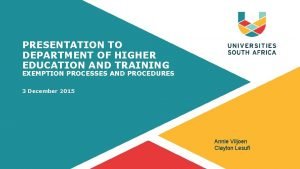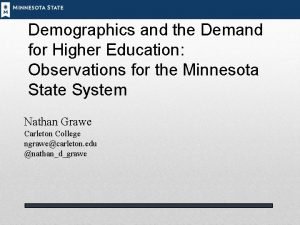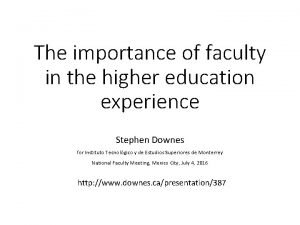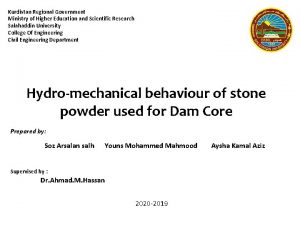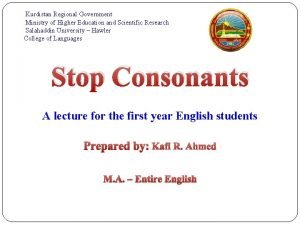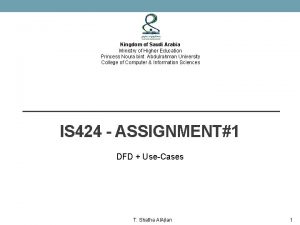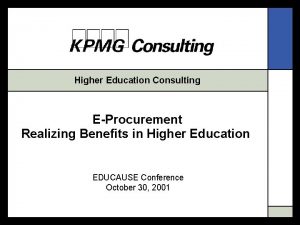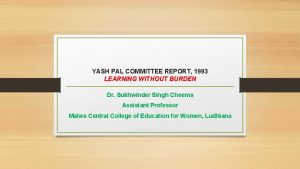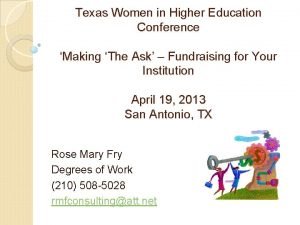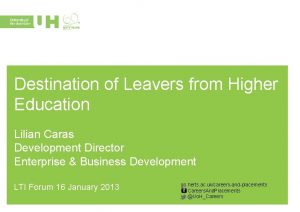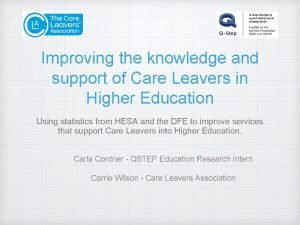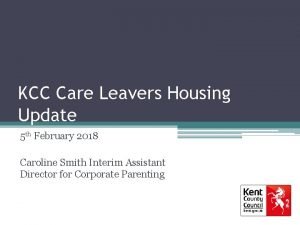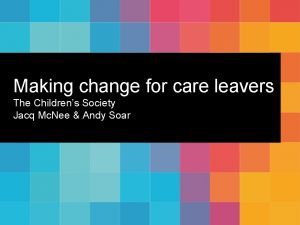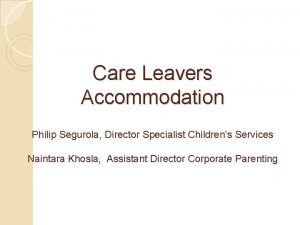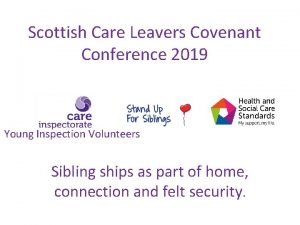Care leavers and higher education getting in and



























- Slides: 27

Care leavers and higher education: getting in and getting through Dr Neil Harrison University of the West of England 29 th November 2016

My own background Background in widening participation and student services before academia Established Care Leavers & University Entry (CLUE) project with Aimhigher funding: 2004 to 2006 Represented AMOSSHE on the initial steering group for the Buttle Trust Quality Mark Member of Bristol Corporate Parenting Panel: 2007 to 2015 Governor of Bristol HOPE virtual school: 2013 to 2015

Care leaver: DFE definition “All children who had been looked after for at least 13 weeks which began after they reached the age of 14 and ended after they reached the age of 16” Does not include those leaving care before 16 Does not include those in short-term placements Not congruent with other ideas of ‘care experience’

Who, then, are care leavers? Following the DFE definition… Those with profound disabilities and care needs Those entering care as a young child, but for whom no permanent placement (e. g. adoption) has been found – often those with challenging situations Those entering care relatively late in childhood – the ‘teenage peak’ – whose school experience likely to be have been disrupted Contrast with wider idea of ‘care-experienced’

Historical starting point ‘By Degrees’ project (Jackson, Ajayi and Quigley, 2005) Estimated that 1% of care leavers entered higher education Tracked cohorts totalling 129 care leavers Drop-out rate 10%, compared to 14% nationally

Recent context 20% % higher education participation rate for care leavers and other disadvantaged young people 18% 16% 14% Care leavers 12% 10% POLAR Q 1 8% 6% 4% 2% 0% 2006 2007 2008 2009 2010 2011 2012 2013 2014 2015 2016 Source: DFE and UCAS

Some mitigating factors Increase in care population, especially teenagers, since 2008 Includes homeless 16/17 year olds classified under the ‘Southwark judgement’ in 2009 Increase in unaccompanied asylum seeking children since 2013 Rapid increase in adoption rates since 2011 => Care leaver population is fluid

Slow progress in schools 70% % achieving five GCSEs at A* to C (or equivalent) including English and Mathematics 60% 50% Children in Care 40% 30% Other children 20% 10% Source: DFE 0% 2007 2008 2009 2010 2011 2012 2013 2014 2015 NB: definition change from 2014

HERACLES project ‘Higher Education: Researching Around Care Leavers’ Entry and Success’ Started September 2016 – funded by NNECL Two strands: Analysis of data from National Pupil Database and Higher Education Statistics Agency – currently awaiting data from DFE National online survey of care-experienced students currently in higher education – live until end of 2016

Student questionnaire Targeted at any care-experienced student in higher education 76 responses from 31 universities/colleges 8% foundation, 84% UG and 8% PG 29% men, 67% women 74% White British, 7% Black African, 5% Black Caribbean, 7% mixed heritage and 4% other 15% consider themselves to be disabled 4% Russell Group, 36% other pre-1992, 50% post-1992 and 5% colleges

Transitions into university 15% I felt that the university supported me well 61% I felt that the university understood my needs as a care leaver 15% 68% My transition into university was a smooth process 24% 61% 0% Disagree 10% 20% Agree 30% 40% 50% 60% 70% 80%

Transition issues Unsupportive foster parents / carers Help with moving belongings Social worker / personal adviser changes Help with health issues / emotional support / form-filling Link-up with other care leavers / loneliness More / simpler information – a ‘step by step’ guide Uncertainty about money / poor support from SFE Feeling like the ‘first one ever’ / bullying / stigma Perceived discrimination about criminal record Bank accounts and background checks

Two tales of local authorities “My local authority was excellent in the transition. I was well informed of everything they would pay and supported with a letter stating I was a care leaver throughout. ” “The local authority was very disorganised and wasn't very informative on what care leavers get when they go university [it] was just stressful and very disorganised. ”

Becoming a care leaver student “I think I found the whole process difficult as I felt so alone and it became really obvious that I didn't have any family or anyone who cared about me. Everyone else had their parents there who helped them unpack, bought them food, and checked in on them. ” “Struggling to get support to deal with the issues that are holding me back and not allowing me to take part fully in uni. Crippling loneliness much of the time. ” “Also, there are bursaries I think I should be entitled to but maybe I [am] missing them. I need someone to sit with me and help me apply for these as I'm not good with form filling. ” “The event of a birth parent enrolling in the same university as myself - requiring me to move to a different university within a week was rather stressful. ”

Getting through university 4% I am doing well at university so far I feel confident about my academic abilities 72% 11% 53% 16% I feel at home in the university community 49% 31% I am coping well with my finances I have a good idea what I want to do after my degree 49% 9% 0% Disagree 10% Agree 69% 20% 30% 40% 50% 60% 70% 80%

Have you thought about leaving? No 42% Yes, once or twice 31% Yes, often 27% 0% 5% 10% 15% 20% 25% 30% 35% 40% 45%

Academic challenges “When the pressures of assignments hit after the Christmas holidays and I felt overwhelmed because I am also a single parent and suffer from a physical impairment. I remained because of the potential people saw in me and because I was motivated to [conquer] my fears and do my best for mine and my son’s future. ” “It can really get to you and be stressful when you realise just how much work is involved. ” “The stress of working and not having the time to do my work. I have stayed to prove those wrong who told me I couldn't do [it]. ”

Upheaval, loneliness and fitting in Regretting giving up a mediocre life with my small social circle in a place I've always known for just a chance at a better life as a professional and all the uprooting feelings that happen during a big move and transition” “High anxiety in first year caused me to think about dropping out, settled in after a while so didn't want to drop out then. ” “I thought about leaving at particularly low points, sometimes I feel that I just don't fit in. ” “Because during my second year I definitely felt quite isolated and helpless”

Feeling unsupported “Lack of family, lack of support. I remained because I remembered who I am, and that's a woman that is capable of following the correct path to success. ” “When things get so hard, sometimes I feel that like uni it's not the right thing for me, but then when I get all the support I needed to do well on my course I feel positive overall. ” “As feel I have no support and no one seems to understand. ” “It’s hard doing it all with no support. Sometimes it seems it will be easier to get a full time job. ”

Money worries and the future “I felt that I shouldn't get into this much debt for nothing. ” “Finances. Chose to remain because the alternatives were worse. ” “Until I approached the care leaver service about their help, I was in severe financial distress and accumulated a lot of debt. ” “Because financially it is difficult to be a student in a private rented home, whilst raising a family and being pregnant. However motivation keeps me at uni because I know it’ll give me better options for career in the future and aid finance in the long run. ”

What more can universities do? More one-to-one (academic) support More understanding / empathy / proactive support Access to ‘unbiased’ support – a different person More money / scholarships / bursaries A ‘mentor’ to help with forms and advocacy Better liaison with local authority / social worker Improved access to ‘counselling’ support But generally university support was seen to be good

Being different and feeling different “I think that lecturers should be more aware about our backgrounds. I was lucky and opened up to my lecturers but they would cry and be in shock when I told them about my home life and my past. ” “Missed appointments because of lack of confidence and not rescheduled appointments because I'm too nervous. ” “It is upsetting see others with a strong family network receiving support […] and not getting that myself. ” “I haven't found anyone like myself. ”

Two tales of care leavers “My university experience has been better than some of my friends who aren't care leavers - I receive extra money and support as a result of being a care leaver. ” “There was a lot of bulling towards me as a care leaver because they thought I had everything when I didn't - people nowadays don't know the value of having 'parents'. ”

And finally… I need your help!!

Who are we missing? Nearly all the Russell Group, and… Bath Bucks New Liverpool JM West London Bath Spa Aston Liverpool Hope London Met Gloucestershire Staffordshire Man Met South Bank Reading Hertfordshire Leeds Beckett East London Sussex Northampton Bradford Royal Holloway Brighton De Montfort Huddersfield Greenwich Christchurch Coventry Central Lancs Kingston Bournemouth Wolverhampton Northumbria Middlesex Anglia Ruskin Derby Cumbria Arts, London East Anglia Nottingham Trent Lancaster Creative Arts Soton Solent Marjon Teesside Roehampton

How can you help? E-mail me – neil. harrison@uwe. ac. uk I will e-mail you with the text of an e-mail to send to your care-experienced or care leaver students Nice and easy – THANKS!

Care leavers and higher education: getting in and getting through Dr Neil Harrison University of the West of England 29 th November 2016
 The secret to getting ahead is getting started
The secret to getting ahead is getting started Primary secondary and tertiary health care
Primary secondary and tertiary health care Department of higher education and training
Department of higher education and training Havering college of further and higher education
Havering college of further and higher education Efficiency and effectiveness in higher education
Efficiency and effectiveness in higher education Demographics and the demand for higher education
Demographics and the demand for higher education Leavers poems year 6
Leavers poems year 6 Web analytics for higher education
Web analytics for higher education Capacity building in the field of higher education
Capacity building in the field of higher education Importance of faculty in higher education
Importance of faculty in higher education Ri board of governors
Ri board of governors Ppc for higher education
Ppc for higher education Ministry of higher education afghanistan
Ministry of higher education afghanistan Massachusetts higher education consortium
Massachusetts higher education consortium Ministry of higher education kurdistan
Ministry of higher education kurdistan Kurdistan
Kurdistan Kurdistan
Kurdistan Ministry of higher education saudi arabia
Ministry of higher education saudi arabia Internationalization of higher education in the philippines
Internationalization of higher education in the philippines Higher education eprocurement
Higher education eprocurement Digital initiatives in higher education
Digital initiatives in higher education Gartner digital transformation in higher education
Gartner digital transformation in higher education Development of higher education in india
Development of higher education in india Learning without burden 1993 ppt
Learning without burden 1993 ppt Collaborative on academic careers in higher education
Collaborative on academic careers in higher education Texas women in higher education
Texas women in higher education Mitochondria
Mitochondria Higher education achievement report
Higher education achievement report


